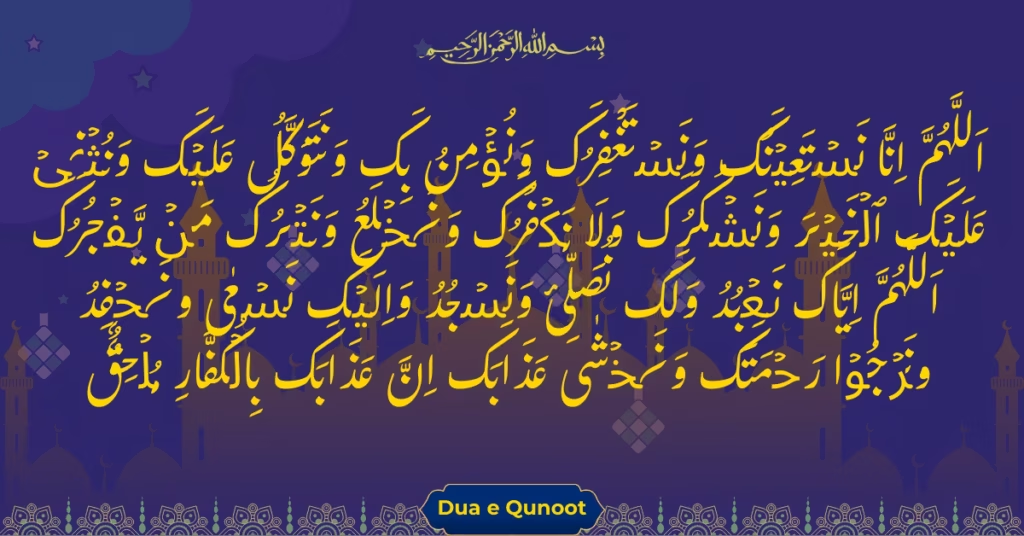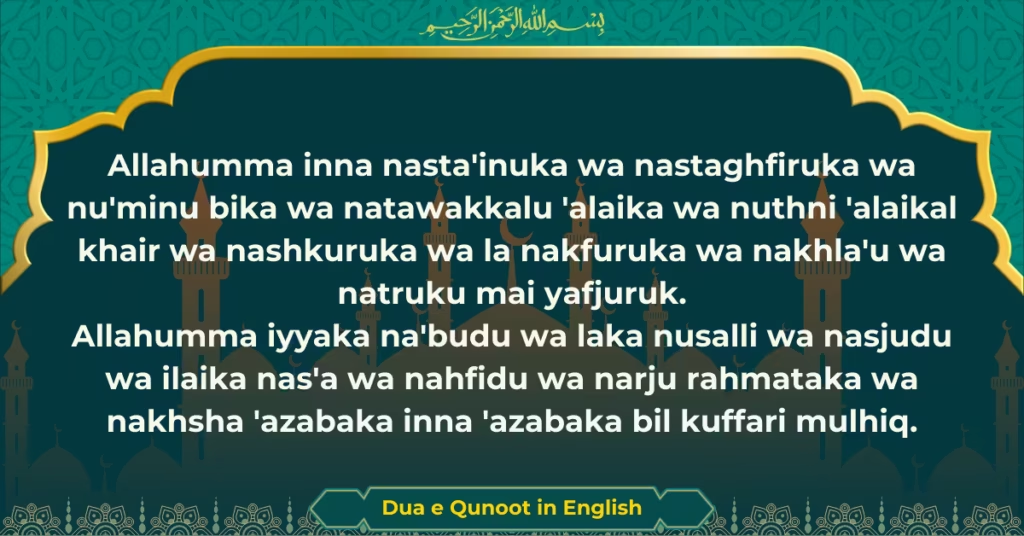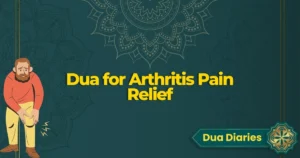
Dua e Qunoot: A Complete Guide for Muslim Families
رہنمائی فہرست Guidance Index
Allah has blessed us with different types of prayers to strengthen our connection with Him. Among these special prayers, Dua e Qunoot holds a unique place in our daily worship. This guide will help you understand what Dua e Qunoot is, when to recite it, and how it can bring you closer to Allah.
What is Dua e Qunoot?
Dua e Qunoot is a special prayer that Muslims recite during the Witr prayer, which is the last prayer of the day. In Arabic, “Qunoot” means being obedient or submissive to Allah. When we say this dua, we’re showing our complete trust in Allah and asking for His help and guidance.
When Do We Recite Dua e Qunoot?
You can recite Dua e Qunoot in these situations:
- During the Witr prayer in the last rakat
- In times of hardship or difficulty
- During Fajr prayer (according to some schools of thought)
[Previous sections remain the same until the Dua section, which is replaced with:]
The Complete Dua e Qunoot: Arabic, Transliteration, and Translation
Arabic Text
اَللَّهُمَّ اِنَّا نَسۡتَعِيۡنُكَ وَنَسۡتَغْفِرُكَ وَنُؤۡمِنُ بِكَ وَنَتَوَكَّلُ عَلَيۡكَ وَنُثۡنِىۡ عَلَيۡكَ ٱلۡخَيۡرَ وَنَشۡكُرُكَ وَلَا نَكۡفُرُكَ وَنَخۡلَعُ وَنَتۡرُكُ مَنۡ يَّفۡجُرُكَ
اَللَّهُمَّ اِيَّاكَ نَعۡبُدُ وَلَكَ نُصَلِّئ وَنَسۡجُدُ وَاِلَيۡكَ نَسۡعٰى ونَحۡفِدُ ونَرۡجُوۡا رَحۡمَتَكَ وَنَخۡشٰى عَذَابَكَ اِنَّ عَذَابَكَ بِالۡكُفَّارِ مُلۡحِقٌٌ

English Transliteration
Allahumma inna nasta’inuka wa nastaghfiruka wa nu’minu bika wa natawakkalu ‘alaika wa nuthni ‘alaikal khair wa nashkuruka wa la nakfuruka wa nakhla’u wa natruku mai yafjuruk.
Allahumma iyyaka na’budu wa laka nusalli wa nasjudu wa ilaika nas’a wa nahfidu wa narju rahmataka wa nakhsha ‘azabaka inna ‘azabaka bil kuffari mulhiq.

English Translation
O Allah! We seek Your help and ask Your forgiveness, and we believe in You and have trust in You, and we praise You in the best way and we thank You and we are not ungrateful to You, and we forsake and turn away from the one who disobeys You.
O Allah! We worship You only and pray to You and prostrate ourselves before You, and we run towards You and serve You, and we hope to receive Your mercy, and we fear Your punishment. Surely, Your punishment overtakes the disbelievers.
The Benefits of Reciting Dua e Qunoot
Spiritual Connection
- Helps build a stronger connection with Allah
- Brings peace to your heart
- Makes your prayers more meaningful
Daily Protection
- Acts as a shield against daily challenges
- Helps you seek Allah’s guidance
- Provides comfort during difficult times
Better Understanding of Faith
- Teaches humility and submission
- Helps understand Allah’s power
- Strengthens your belief
How to Recite Dua e Qunoot Step by Step
Start Position
- Stand straight in your prayer
- Raise your hands to shoulder level
- Keep your palms facing upward
Voice and Tone
- Recite in a clear voice
- Take your time with each word
- Focus on the meaning
Proper Timing
- Say it after reading Surah Fatiha
- Recite before going into ruku
- Keep a steady pace
Teaching Dua e Qunoot to Children
Make it Simple
- Break down the dua into small parts
- Explain the meaning in easy words
- Use stories to explain its importance
Practice Together
- Set a regular time for practice
- Make it fun and interactive
- Reward their efforts
Use Visual Aids
- Write the dua in big letters
- Create colorful charts
- Use mobile apps designed for learning duas
Common Questions About Dua e Qunoot
Is Dua e Qunoot Required in Every Prayer?
No, it’s not required in every prayer. It’s mainly recited during the Witr prayer, which comes after Isha prayer.
What If I Don’t Know the Arabic Words?
You can start by learning the translation and meaning. Then, gradually learn the Arabic words. The intention and understanding matter most.
Can I Read It from a Book While Praying?
It’s better to memorize it, but while learning, you can keep a written copy nearby to help you remember.
Tips for Memorizing Dua e Qunoot
Break It Down
- Learn one line at a time
- Understand the meaning of each part
- Practice regularly
Use Memory Techniques
- Write it down multiple times
- Record yourself reciting it
- Listen to the recording while doing other tasks
Practice with Family
- Set family learning time
- Help each other remember
- Make it a daily habit
The Historical Significance
Dua e Qunoot has been part of Muslim prayers since the time of Prophet Muhammad (peace be upon him). The Prophet taught this dua to his companions, and it has been passed down through generations.
Special Times to Recite Dua e Qunoot
During Ramadan
- Especially in Witr prayers
- During Tahajjud
- In the last ten nights
During Difficult Times
- When facing problems
- During community hardships
- In times of natural disasters
For Special Requests
- When making important decisions
- Before starting new projects
- When seeking specific help from Allah
Building a Strong Prayer Routine
Start Small
- Begin with one prayer at a time
- Add Dua e Qunoot gradually
- Be consistent
Create the Right Environment
- Find a quiet prayer space
- Keep prayer materials ready
- Maintain cleanliness
Stay Motivated
- Remember the benefits
- Track your progress
- Share experiences with family
Conclusion
Dua e Qunoot is more than just words we say in prayer. It’s a powerful way to connect with Allah and seek His guidance in our daily lives. By understanding and regularly reciting this dua, we can strengthen our faith and find peace in our hearts. Remember, Allah always listens to our prayers, and every word we say to Him matters.
May Allah accept our prayers and guide us all on the right path. Start including Dua e Qunoot in your prayers today, and feel the difference it makes in your spiritual journey.



